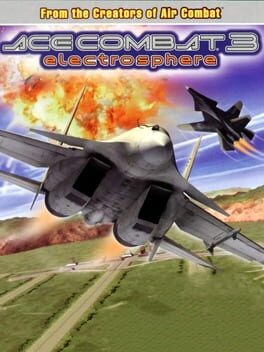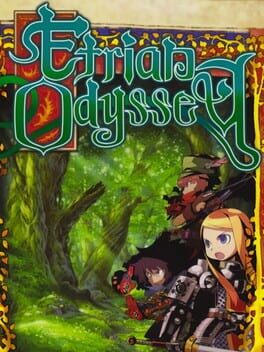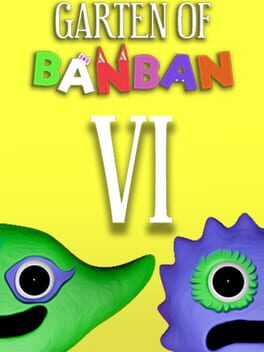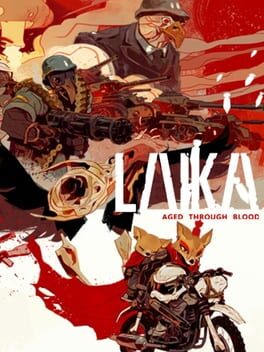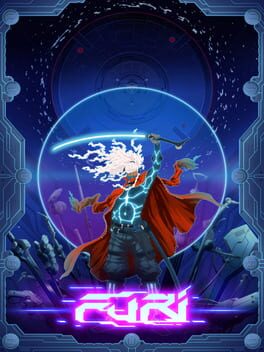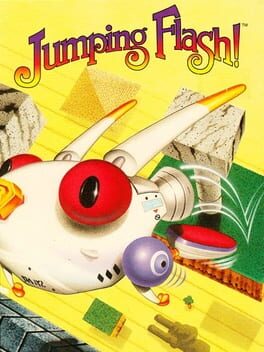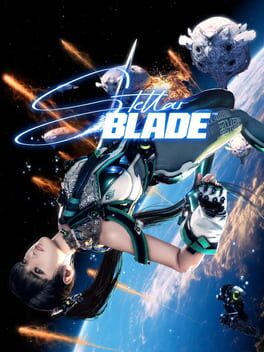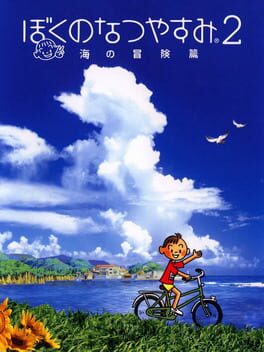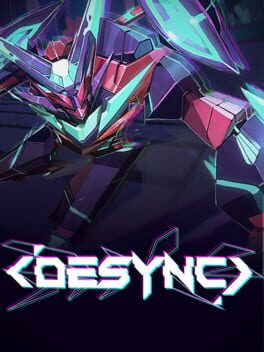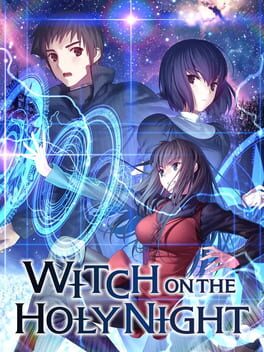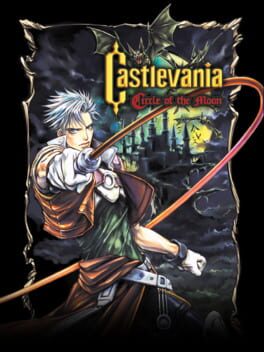DrDelicious
1606 Reviews liked by DrDelicious
" Alright we're in charge of localizing this, what's the story like again? "
" The world in the near future reached such a stage of late unregulated liberalism that 2 companies have more power than every other nation combined, and they declare war against one another because they would rather destroy half the world than not have a total market monopoly. "
" Hmmm how about we change that so that capitalism is good actually and there's a shadow government manipulating those companies who are innocenet and don't know any better (also their leader is named Aurora, thats important), and when you beat them... you achieve eternal world peace? "
" Sure. "
" The world in the near future reached such a stage of late unregulated liberalism that 2 companies have more power than every other nation combined, and they declare war against one another because they would rather destroy half the world than not have a total market monopoly. "
" Hmmm how about we change that so that capitalism is good actually and there's a shadow government manipulating those companies who are innocenet and don't know any better (also their leader is named Aurora, thats important), and when you beat them... you achieve eternal world peace? "
" Sure. "
Etrian Odyssey
2007
I'm in love with the way EO leverages the DS to digitize manual mapping. absolutely wonderful, beautiful stuff that captures the spirit of the genre a billion million zillion times better than any automap ever could. in a perfect world this would've heralded imitative ports of every drpg under the sun, and all of them would've been strong contenders for the best versions by default. unfortunately we live in the eternal piss and shit dimension so I'm doomed to pout about the missed opportunity for the rest of my life
as for the rest: game's like one of those images where either you see the old crone or the smokin hot babe; the lamp or the smoking hot babe; the white and gold dress or the smokin hot babe. you know?
from what I gather if you're coming at it from an EO perspective this thing feels like it was coded straight into zhoukoudian limestone by the peking man. folks act like it's the dustiest, crustiest, most satanic verses ass antipathetic crawler ever made. they're out here throwing blankets over their ds at night like a furby to stop it from talking backwards and shit
but if you're coming at it from a broader drpg ("blobbers" if ya nasty) perspective it's almost the complete opposite: decidedly modern, breezy, and accommodating; its push toward transparency, telegraphs, and convenience at odds with the core tension loop pre-bradley wizardry clones fundamentally rely on
I fall into the second category and found most of this to be pretty dry. by the time I hit the 5th Stratum I was approaching vegetative status, zoning out and mashing A with one hand while reading scandalous celebrity gossip on my phone in the other. hovering out of body, well above the dungeon rather than being subsumed by it; existing outside of stress, anxiety, and uneasy decision making. EO just doesn't got the stomach to wrench your guts around, put you on the perpetual backstep, or fill the role of derelict steward the way the most successful clones do
which is fine! I like most of the experimentation here in isolation; there's a dialogue happening that's a lot more interesting than reheating 1980-1988 endlessly. the deterministic angle opens up a lot of unique design avenues; character building could easily swerve toward embracing shortform tactics over longform attrition; and moments like B20F show that FOEs can be more than softball fodder goin woop woop woop in a 3x3 grid. there's a lot to be excited about, it just needs to be contextualized in ways that flatter rather than compromise
more than anything EO needs to stop being uncomfortable in borrowed skin and start being comfortable in its own. no reason to be another mediocre wizardry when it could be a great etrian odyssey 🌈 ⭐❤️
as for the rest: game's like one of those images where either you see the old crone or the smokin hot babe; the lamp or the smoking hot babe; the white and gold dress or the smokin hot babe. you know?
from what I gather if you're coming at it from an EO perspective this thing feels like it was coded straight into zhoukoudian limestone by the peking man. folks act like it's the dustiest, crustiest, most satanic verses ass antipathetic crawler ever made. they're out here throwing blankets over their ds at night like a furby to stop it from talking backwards and shit
but if you're coming at it from a broader drpg ("blobbers" if ya nasty) perspective it's almost the complete opposite: decidedly modern, breezy, and accommodating; its push toward transparency, telegraphs, and convenience at odds with the core tension loop pre-bradley wizardry clones fundamentally rely on
I fall into the second category and found most of this to be pretty dry. by the time I hit the 5th Stratum I was approaching vegetative status, zoning out and mashing A with one hand while reading scandalous celebrity gossip on my phone in the other. hovering out of body, well above the dungeon rather than being subsumed by it; existing outside of stress, anxiety, and uneasy decision making. EO just doesn't got the stomach to wrench your guts around, put you on the perpetual backstep, or fill the role of derelict steward the way the most successful clones do
which is fine! I like most of the experimentation here in isolation; there's a dialogue happening that's a lot more interesting than reheating 1980-1988 endlessly. the deterministic angle opens up a lot of unique design avenues; character building could easily swerve toward embracing shortform tactics over longform attrition; and moments like B20F show that FOEs can be more than softball fodder goin woop woop woop in a 3x3 grid. there's a lot to be excited about, it just needs to be contextualized in ways that flatter rather than compromise
more than anything EO needs to stop being uncomfortable in borrowed skin and start being comfortable in its own. no reason to be another mediocre wizardry when it could be a great etrian odyssey 🌈 ⭐❤️
Garten of Banban 6
2023
Furi
2016
Honestly about still as good as I remember?
I feel like there's more to appreciate coming back to it now in a,, endearing way. It's like a collective playable synthwave album, down to how the attacks are basically a rhythm, but just jumbled around by bursts of twin stick sections and walking moments where you let the music play while a stupid pastiche narrates at you. And all of that is still really really fun to me. I'm enjoying the push and pull like normal, even if it's all rudimentary now that I've already beaten Furier and still have the muscle memory.
Which really surprised me, because I think that's the kind of opaque bullshit I would come back and go "wow this meant genuinely nothing, what the fuck did they think they were cooking?", but with all the environments and how the music sways it comes off more in the stoner sense where they THOUGHT they were being so interesting and deep but their eyes are staring blank straight through you lol. That's like the best way I can explain why it's fun to experience on a return.
It congeals together in such a way that I find myself unable to resent its very standard and now blatantly generic "phase" design. It's like yeah, I can get into it ^.=.^ I'm still banging my head to You're Mine, after all. Hilariously it makes me feel like I'm too harsh on Sekiro that This is the rhythm like action game I'm eating up today.
I feel like there's more to appreciate coming back to it now in a,, endearing way. It's like a collective playable synthwave album, down to how the attacks are basically a rhythm, but just jumbled around by bursts of twin stick sections and walking moments where you let the music play while a stupid pastiche narrates at you. And all of that is still really really fun to me. I'm enjoying the push and pull like normal, even if it's all rudimentary now that I've already beaten Furier and still have the muscle memory.
Which really surprised me, because I think that's the kind of opaque bullshit I would come back and go "wow this meant genuinely nothing, what the fuck did they think they were cooking?", but with all the environments and how the music sways it comes off more in the stoner sense where they THOUGHT they were being so interesting and deep but their eyes are staring blank straight through you lol. That's like the best way I can explain why it's fun to experience on a return.
It congeals together in such a way that I find myself unable to resent its very standard and now blatantly generic "phase" design. It's like yeah, I can get into it ^.=.^ I'm still banging my head to You're Mine, after all. Hilariously it makes me feel like I'm too harsh on Sekiro that This is the rhythm like action game I'm eating up today.
Jumping Flash!
1995
Stellar Blade
2024
Desync
2017
Kind of interesting how much the space of these years were really into the sort of Tron/FC3 Blood Dragon Cyberspace. I think it's kind of "fun" in the way any cotton candy town can be appealing and enjoyable. Now on replay it hurts my eyes every so often, almost intentionally with its awful and absolutely dire random tv-crt cuts.
And that sums up the experience, awful every so often in a disappointing way. When the overall work grabs you it can be genuinely incredible, with desyncing enemies and comboing sequences together to become an absolute fast-and-furious powerhouse that demolishes through tactile precision and great understandings of your gunplay fundamentals. Things like blowing up a stage bomb to turn a few slashing enemies into projectiles that you've conveniently pushed towards an increasingly large shuriken, getting a particular bonus you set up ahead of time, to then use the new speed to rocket up another set of enemies that you then laser point-blank underneath their hides for ANOTHER bonus.
And then the encounter is already over.
What?
Yeah, the game is honestly way too forgiving, way too easy. It's so afraid of throwing particular enemy combos at you or putting too much on you that even its second boss fight will go invulnerable and just stand there staring at you while you take care of a poultry wave first. The real meat is in its aberration challenges, but those kind of pull apart having your own "sandbox" to combo enemies in favor of a pre-determined affair. Which I do personally prefer, but it means that about 3/4 of whatever setup you do with the menuing means nothing if the weapons are different.
But, when you've accustomed to the game's own rhythm, they provide the closest Desync gets to pulling you apart in a very engaging way. When these hardmode levels take away your dash and force you to tactfully make your kills to get back HP before your meter runs out. When you're playing a weird game of "keep-away" with weapons that require getting at least a bit close to do proper damage, because the enemies now decided to explode on overkill. When you've got one hit to your name and a host of smaller enemies swarming on you and there's only ONE way you can stagger them to do damage in the first place.
It all helps that at the end of the day this is a very fun frictional shooter, with devs at a midway point where they don't give a shit what you think but also graft on a rpg-your-weapon modifications because that's a thing now. It's a team that lets you be able to make the final boss a multi-enemy one of your own volition and say "deal with it", and has the least accessibility for its nauseating interface. The moniker "adult swim games" has great meaning here, and that's pretty cool.
And that sums up the experience, awful every so often in a disappointing way. When the overall work grabs you it can be genuinely incredible, with desyncing enemies and comboing sequences together to become an absolute fast-and-furious powerhouse that demolishes through tactile precision and great understandings of your gunplay fundamentals. Things like blowing up a stage bomb to turn a few slashing enemies into projectiles that you've conveniently pushed towards an increasingly large shuriken, getting a particular bonus you set up ahead of time, to then use the new speed to rocket up another set of enemies that you then laser point-blank underneath their hides for ANOTHER bonus.
And then the encounter is already over.
What?
Yeah, the game is honestly way too forgiving, way too easy. It's so afraid of throwing particular enemy combos at you or putting too much on you that even its second boss fight will go invulnerable and just stand there staring at you while you take care of a poultry wave first. The real meat is in its aberration challenges, but those kind of pull apart having your own "sandbox" to combo enemies in favor of a pre-determined affair. Which I do personally prefer, but it means that about 3/4 of whatever setup you do with the menuing means nothing if the weapons are different.
But, when you've accustomed to the game's own rhythm, they provide the closest Desync gets to pulling you apart in a very engaging way. When these hardmode levels take away your dash and force you to tactfully make your kills to get back HP before your meter runs out. When you're playing a weird game of "keep-away" with weapons that require getting at least a bit close to do proper damage, because the enemies now decided to explode on overkill. When you've got one hit to your name and a host of smaller enemies swarming on you and there's only ONE way you can stagger them to do damage in the first place.
It all helps that at the end of the day this is a very fun frictional shooter, with devs at a midway point where they don't give a shit what you think but also graft on a rpg-your-weapon modifications because that's a thing now. It's a team that lets you be able to make the final boss a multi-enemy one of your own volition and say "deal with it", and has the least accessibility for its nauseating interface. The moniker "adult swim games" has great meaning here, and that's pretty cool.
The understandings that come between characters worlds apart, rendered blissfully through everyday life, from absurd to natural. Nasu's most interpersonal poignant work I feel, largely by nature of being invested in the day-to-day growth between its cast, reflecting on people throughout their days of steely clouds, fallen snow, and fairy tale amusement parks. Ever more blissfully held up by how Type Moon's characters are given such vibrancy, with each interaction always flowing off the page for me into a real group of multifaceted people ^/w/^
I will admit though, that I found myself wishing there was more to chew on than what's here. There's a crazy good juxtaposition between the changing architecture, the diametrically opposed functions of old and new, nostalgic and living-in-the-present, but it ends up becoming more cornerstones of the players of life rather than delved into thinkpieces. Which is largely the point, after all, as this is coming-of-age in its truest form. Everything is open, wide, and turning pages into a more difficult cityscape that demands resolution from you as you're just starting to figure out what you're looking for. And in that way the platitudes, the stories of making the most of your life, the ending divvying up of regrets you still have of the life you've led so far, all culminate together into something deeply fulfilling.
It's a wonderfully graceful work with all that. I'll really have to think on it a lot more as I leave it.
I will admit though, that I found myself wishing there was more to chew on than what's here. There's a crazy good juxtaposition between the changing architecture, the diametrically opposed functions of old and new, nostalgic and living-in-the-present, but it ends up becoming more cornerstones of the players of life rather than delved into thinkpieces. Which is largely the point, after all, as this is coming-of-age in its truest form. Everything is open, wide, and turning pages into a more difficult cityscape that demands resolution from you as you're just starting to figure out what you're looking for. And in that way the platitudes, the stories of making the most of your life, the ending divvying up of regrets you still have of the life you've led so far, all culminate together into something deeply fulfilling.
It's a wonderfully graceful work with all that. I'll really have to think on it a lot more as I leave it.
Final Fantasy X
2001
they don't make them like this anymore, man. everything about final fantasy x bleeds unfettered confidence and an uncontrollable optimism for games as a medium of art and entertainment alike; not only did kitase and his posse clearly believe video games could Be More but they were doing everything in their power to make those dreams corporeal, to make the future of games become a "here and now" rather than some distant aspiration that video games could one day hope to touch. it's really funny how hallmark western titles like braid or the last of us that would come in the ballpark of a decade later were lauded as "games finally being art," or kojima's insistent and insensitive portrayals of sexual assault in metal gear solid v to apparently "validate" games as art suggest an insecurity in the form, a need to prove itself, when squaresoft in their prime knew games were something special and were putting in all the legwork they could to make people see that and had been doing that since the eighties.
though i treasure final fantasy xvi, i can't help but look at it as having fallen to the same insecurity i alluded to in the aforementioned western titles - which makes ffx's confidence in itself and celebration of its own achievements all the more commanding of respect and admiration. yoshi-p wanted a return to a more conventional fantasy setting so he neutered a lot of the whimsy and off-the-wall wackiness from final fantasy for a grim-and-grisly dark fantasy setting inspired by the hot-button fantasy stories of the era such as game of thrones and god of war. what did kitase do whenever his fanbase demanded a return to a traditional european fantasy setting? he acted in direct defiance of that and instead looked to the folklore, customs, cultures and traditions of east and southeast asia (in particular okinawa) and started from the ground up, sculpting every aspect of the game to make something unlike anything final fantasy had ever seen or would ever see again. that even bleeds into its storytelling - sure, final fantasy x gets a lot of flak as the "goofy" one due to tidus's infamous laugh (fuck you it's one of the best romance scenes in all of final fantasy) or its loud-and-proud nature as a product of the turn of the millenia, but i think this is probably final fantasy's most gripping and eloquent political narrative... even and especially in comparison to the more "serious" political final fantasy games such as tactics, xii and (again) xvi. while a lot of political narratives in jrpgs tend to more broadly broach abstract ideas about classism, imperialism and war, final fantasy x's politics are rooted firmly in okinawa's historical relationship with mainland japan and the ties therein with institutional religion in modern-day japan. it's an aggressively japanese game in just about every manner, to the point where i can't help but wonder if there's a tie between ffx being the laughingstock of the series in the mid-to-late 00s and the really racist hatred of japanese games in the west during the seventh console gen... hmm
speaking of the seventh gen and onward it feels like every single way that developers try to flex the power of their hardware and their grasp over it is just graphics, graphics, graphics, to the point where we're getting diminishing returns and the games just flatly don't look all that great because they're bereft of visual direction and identity. i'm not really gonna do much talking about x's graphics (although this is STILL probably one of the best-looking ps2 games, especially those fmvs - oh my god!)... again, compensating for something, forgetting what makes games what they are. like yeah, games are a medium of art capable of conveying powerful messages and emotions like any other medium, but games are fun too! and man, what a better way to flex the capabilities of the recently-launched playstation 2 by making final fantasy x a GAME's game on top of all the shit it has to say as a story. there's so much shit to do in this game, man. it seems like every other nook and cranny has some minigame, sidequest or post-game content for you to sink your teeth into, squaresoft just packing all this random bullshit into this game because they COULD. like fuck, did you know there's a butterfly hunting minigame in the macalania lake? i sure as hell didn't until this playthrough!
i can't help but mourn what games have become and the state of the industry over the past decade and some change. square enix is a shell of its former self between its unbelievably slimy business practices and the increasingly-cynical nature of its output and middling quality of its games. final fantasy x seems like a relic of a bygone era that we can never return to, a reminder of better times, and a testament to the potential that video games in the AAA sphere have broadly failed to live up to.
but - true to the game's main message - final fantasy x also acts as a reminder of what games can be, what we can hope for and expect out of games, and a reminder that games are not inherently as rotten as the industry nowadays would lead you to believe. who knows? i certainly don't, but i also don't want to just give up and accept the stagnation that games have broadly been reduced to, or resign myself that this spiral of cynical corporate product-pushing is all that there is.
and i don't have to, really. the glory days of the aaa sphere might be over, but making games (and sharing them) is easier than ever. the titans of tomorrow are getting their start now with nothing more than their passion for the medium and a desire to connect with people whose passion matches theirs. ultimately, that's what brings people together to begin with: shared convictions, shared faith, shared ideals and shared love for their favorite things in the world.
and when that love brings people together and unites them in a common belief, thus enabling them to exert their will upon the world at whatever scale their numbers and determination allow for... things change. isn't it wonderful?
though i treasure final fantasy xvi, i can't help but look at it as having fallen to the same insecurity i alluded to in the aforementioned western titles - which makes ffx's confidence in itself and celebration of its own achievements all the more commanding of respect and admiration. yoshi-p wanted a return to a more conventional fantasy setting so he neutered a lot of the whimsy and off-the-wall wackiness from final fantasy for a grim-and-grisly dark fantasy setting inspired by the hot-button fantasy stories of the era such as game of thrones and god of war. what did kitase do whenever his fanbase demanded a return to a traditional european fantasy setting? he acted in direct defiance of that and instead looked to the folklore, customs, cultures and traditions of east and southeast asia (in particular okinawa) and started from the ground up, sculpting every aspect of the game to make something unlike anything final fantasy had ever seen or would ever see again. that even bleeds into its storytelling - sure, final fantasy x gets a lot of flak as the "goofy" one due to tidus's infamous laugh (fuck you it's one of the best romance scenes in all of final fantasy) or its loud-and-proud nature as a product of the turn of the millenia, but i think this is probably final fantasy's most gripping and eloquent political narrative... even and especially in comparison to the more "serious" political final fantasy games such as tactics, xii and (again) xvi. while a lot of political narratives in jrpgs tend to more broadly broach abstract ideas about classism, imperialism and war, final fantasy x's politics are rooted firmly in okinawa's historical relationship with mainland japan and the ties therein with institutional religion in modern-day japan. it's an aggressively japanese game in just about every manner, to the point where i can't help but wonder if there's a tie between ffx being the laughingstock of the series in the mid-to-late 00s and the really racist hatred of japanese games in the west during the seventh console gen... hmm
speaking of the seventh gen and onward it feels like every single way that developers try to flex the power of their hardware and their grasp over it is just graphics, graphics, graphics, to the point where we're getting diminishing returns and the games just flatly don't look all that great because they're bereft of visual direction and identity. i'm not really gonna do much talking about x's graphics (although this is STILL probably one of the best-looking ps2 games, especially those fmvs - oh my god!)... again, compensating for something, forgetting what makes games what they are. like yeah, games are a medium of art capable of conveying powerful messages and emotions like any other medium, but games are fun too! and man, what a better way to flex the capabilities of the recently-launched playstation 2 by making final fantasy x a GAME's game on top of all the shit it has to say as a story. there's so much shit to do in this game, man. it seems like every other nook and cranny has some minigame, sidequest or post-game content for you to sink your teeth into, squaresoft just packing all this random bullshit into this game because they COULD. like fuck, did you know there's a butterfly hunting minigame in the macalania lake? i sure as hell didn't until this playthrough!
i can't help but mourn what games have become and the state of the industry over the past decade and some change. square enix is a shell of its former self between its unbelievably slimy business practices and the increasingly-cynical nature of its output and middling quality of its games. final fantasy x seems like a relic of a bygone era that we can never return to, a reminder of better times, and a testament to the potential that video games in the AAA sphere have broadly failed to live up to.
but - true to the game's main message - final fantasy x also acts as a reminder of what games can be, what we can hope for and expect out of games, and a reminder that games are not inherently as rotten as the industry nowadays would lead you to believe. who knows? i certainly don't, but i also don't want to just give up and accept the stagnation that games have broadly been reduced to, or resign myself that this spiral of cynical corporate product-pushing is all that there is.
and i don't have to, really. the glory days of the aaa sphere might be over, but making games (and sharing them) is easier than ever. the titans of tomorrow are getting their start now with nothing more than their passion for the medium and a desire to connect with people whose passion matches theirs. ultimately, that's what brings people together to begin with: shared convictions, shared faith, shared ideals and shared love for their favorite things in the world.
and when that love brings people together and unites them in a common belief, thus enabling them to exert their will upon the world at whatever scale their numbers and determination allow for... things change. isn't it wonderful?
I'm tired.
Let's play armchair game designer, because lord knows we don't have enough of them on here.
Before you can run, you must walk, and boy does Nathan Graves enjoy walking. Nathan just adores going on a stroll in Camilla's castle while his master's getting his toenails ripped off in preparation for being slaughtered in a satanic ritual. Mr. Graves wouldn't know how to run even if I slapped his dump truck ass with the world's most painful block of wood. It's a godsend that Camilla's basement houses the very shoes he needs to be able to find the joys of exercise again after he forgot how to sprint when Count Dankula played his Trap Hole card in the introduction scene. One must wonder how long it would've taken if Drac's minions didn't make such a fuck up as to leave shoes for Mr. Graves to wear for his aching strolling feet. Even with these shoes Nathan only knows how to barrel forward with wanton disregard for his own being. Alucard had it figured out already, just run with care. That's all you gotta do. For Nathan though? Only two speeds exist. Tortoise, and drunken hare riding on a Kawasaki Ninja.
The input for running in this game is bad enough with requiring me to dash dance on the dpad and kill my thumbs, but Nathan's whip attack is noticeably sluggish compared to past Classicvania outings. It may not be noticeable at first, but try ducking and whipping and go back to playing as Simon in any of the past games and you'll definitely feel it. Nathan can jump like a stiff pong paddle and can even wall jump, and trust me I'm proud of him for being able to do so, but he should stick to his day job. Wall jumping in this is automated for at least two seconds as Nathan pauses on the wall and propels himself into the direction of enemy fire that sends him careening back down the pit that he was trying to make his way up from. You will encounter this scenario a lot, I assure you, especially with Circle of the Moon's obsession with slap dashing Armor enemies everywhere with annoying attacks that can bop you from the other side of the screen. No joke, I had a moment where I thought I was hitting an Ice Armor enemy in the underground waterway safely, only to get a very pleasant surprise in the form of another spear flying from off screen and stabbing me through the adam's apple thanks to the second Ice Armor that was behind him.
The primary system is collecting some shitty Yu-Gi-Oh cards and playing Blackjack with yourself to combine two of them and give yourself some form of power up, which could range from boring effects like your whip getting an elemental bonus, or actual cool shit like turning into a bone-throwing skeleton that dies in one hit. Unfortunately, the card for turning into a glass jawed skeleton is about 95% into the game and requires killing a very specific candle enemy that requires backtracking to a who-gives-a-shit area, and kindly asking it to drop the damn card sometime this week. This is where I get to bitch about the worst part of Circle of the Moon besides Nathan's completely useless movement, and it's the outrageous drop rates. That card that I'd need for the aforementioned skeleton transformation? The drop rate is zero point four fuckin' percent. That doesn't just effect the cards either. Health items? What are those?!
Seriously, I went for hours playing this game and didn't think healing was even a thing in Circle of the Moon besides the absurdly paltry potions that give a measly 20 hit points back, or getting to one of the sparse save points that fully heals you. Hell, you don't even get healed after boss fights. I beat probably six bosses before a piece of meat suddenly dropped from an enemy, where I double-taked and went back just to stare at it for a while. There is not a shop to speak of either, shopkeepers aren't welcome in Circle of the Moon. No buyable health items for you to help with the horrendous onslaught of tedium, but you can go ahead and enjoy all those completely useless armors you get to lug around on your person. Sure is a hard game we got here, would be nice if I could have some items, but Dracula is against formal goods trading.
Circle of the Moon is about inconvenience. It inconveniences you with movement that isn't convenient for the challenge that is set up for you as it would be for past entries. The only way to make your pathetic movement less inconvenient is to find cards inconveniently hidden away in an unknown enemy's back pocket that could potentially make certain encounters flat out trivial, like the normally problematic ice element in the underground waterway, or Dracula's nigh-impossible to dodge meteor attack in the final battle. It's all an inconvenient excuse to grind if you lack information, which this game inconveniently gives you none assuming you're not playing the Advance Collection version, which was the only convenient bit from my experience. Thanks M2.
It took me about three months to finish the save file I started on the Advance Collection a ways back after I completed Harmony of Dissonance and it's toilet noises, and it's mindbogglingly to me to realize that it was around last Christmas that I replayed and finished Aria of Sorrow again on the same collection. It wasn't necessarily a skill issue, it was a thumb issue from the horrendous dash input, and my complete apathy to this game's entire philosophy of wanting to train me on it's solitaire system only for the battle arena to give me the middle finger, and take that same system away in the ultimate show of disrespectful inconvenience. It was optional, sure, but it's existence is more than enough to make me want to transition into a volcanic state. It was even more aggravating to find out that Konami apparently bumped the experience requirements up for the western releases, thus demanding me to update the list for all the times they fucked us in the ass. I needed a lot of Picross breaks, and apparently a detour to that Peach game I didn't care about.
It kinda goes without saying, but the thought of replaying this on original hardware with the bad GBA screen, no suspend save, or in-game overlay hints of what enemies are carrying cards is less appealing to me than taking an epilator to my ballsack. I'll give it a pity star for Dracula's final boss design, I guess. I guess.
Thus concludes armchair game designer session, if you enjoyed what you've read, please like, comment, subscribe, ring the dingaling, and maybe sing me a nice song.
I'm going to bed now. Goodnight.
hoooooonkmimimimimi.
+Nathan Graves dump truck ass
+Rakugakids reference
+Yo Camilla call me
+Proof of Blood
-Nathan Graves dump truck ass
-Sinking Old Sanctuary?! More like Stinking Old Sanctuary!
-Why is my hair not as nice as Hugh's
-Where's my burrito
Let's play armchair game designer, because lord knows we don't have enough of them on here.
Before you can run, you must walk, and boy does Nathan Graves enjoy walking. Nathan just adores going on a stroll in Camilla's castle while his master's getting his toenails ripped off in preparation for being slaughtered in a satanic ritual. Mr. Graves wouldn't know how to run even if I slapped his dump truck ass with the world's most painful block of wood. It's a godsend that Camilla's basement houses the very shoes he needs to be able to find the joys of exercise again after he forgot how to sprint when Count Dankula played his Trap Hole card in the introduction scene. One must wonder how long it would've taken if Drac's minions didn't make such a fuck up as to leave shoes for Mr. Graves to wear for his aching strolling feet. Even with these shoes Nathan only knows how to barrel forward with wanton disregard for his own being. Alucard had it figured out already, just run with care. That's all you gotta do. For Nathan though? Only two speeds exist. Tortoise, and drunken hare riding on a Kawasaki Ninja.
The input for running in this game is bad enough with requiring me to dash dance on the dpad and kill my thumbs, but Nathan's whip attack is noticeably sluggish compared to past Classicvania outings. It may not be noticeable at first, but try ducking and whipping and go back to playing as Simon in any of the past games and you'll definitely feel it. Nathan can jump like a stiff pong paddle and can even wall jump, and trust me I'm proud of him for being able to do so, but he should stick to his day job. Wall jumping in this is automated for at least two seconds as Nathan pauses on the wall and propels himself into the direction of enemy fire that sends him careening back down the pit that he was trying to make his way up from. You will encounter this scenario a lot, I assure you, especially with Circle of the Moon's obsession with slap dashing Armor enemies everywhere with annoying attacks that can bop you from the other side of the screen. No joke, I had a moment where I thought I was hitting an Ice Armor enemy in the underground waterway safely, only to get a very pleasant surprise in the form of another spear flying from off screen and stabbing me through the adam's apple thanks to the second Ice Armor that was behind him.
The primary system is collecting some shitty Yu-Gi-Oh cards and playing Blackjack with yourself to combine two of them and give yourself some form of power up, which could range from boring effects like your whip getting an elemental bonus, or actual cool shit like turning into a bone-throwing skeleton that dies in one hit. Unfortunately, the card for turning into a glass jawed skeleton is about 95% into the game and requires killing a very specific candle enemy that requires backtracking to a who-gives-a-shit area, and kindly asking it to drop the damn card sometime this week. This is where I get to bitch about the worst part of Circle of the Moon besides Nathan's completely useless movement, and it's the outrageous drop rates. That card that I'd need for the aforementioned skeleton transformation? The drop rate is zero point four fuckin' percent. That doesn't just effect the cards either. Health items? What are those?!
Seriously, I went for hours playing this game and didn't think healing was even a thing in Circle of the Moon besides the absurdly paltry potions that give a measly 20 hit points back, or getting to one of the sparse save points that fully heals you. Hell, you don't even get healed after boss fights. I beat probably six bosses before a piece of meat suddenly dropped from an enemy, where I double-taked and went back just to stare at it for a while. There is not a shop to speak of either, shopkeepers aren't welcome in Circle of the Moon. No buyable health items for you to help with the horrendous onslaught of tedium, but you can go ahead and enjoy all those completely useless armors you get to lug around on your person. Sure is a hard game we got here, would be nice if I could have some items, but Dracula is against formal goods trading.
Circle of the Moon is about inconvenience. It inconveniences you with movement that isn't convenient for the challenge that is set up for you as it would be for past entries. The only way to make your pathetic movement less inconvenient is to find cards inconveniently hidden away in an unknown enemy's back pocket that could potentially make certain encounters flat out trivial, like the normally problematic ice element in the underground waterway, or Dracula's nigh-impossible to dodge meteor attack in the final battle. It's all an inconvenient excuse to grind if you lack information, which this game inconveniently gives you none assuming you're not playing the Advance Collection version, which was the only convenient bit from my experience. Thanks M2.
It took me about three months to finish the save file I started on the Advance Collection a ways back after I completed Harmony of Dissonance and it's toilet noises, and it's mindbogglingly to me to realize that it was around last Christmas that I replayed and finished Aria of Sorrow again on the same collection. It wasn't necessarily a skill issue, it was a thumb issue from the horrendous dash input, and my complete apathy to this game's entire philosophy of wanting to train me on it's solitaire system only for the battle arena to give me the middle finger, and take that same system away in the ultimate show of disrespectful inconvenience. It was optional, sure, but it's existence is more than enough to make me want to transition into a volcanic state. It was even more aggravating to find out that Konami apparently bumped the experience requirements up for the western releases, thus demanding me to update the list for all the times they fucked us in the ass. I needed a lot of Picross breaks, and apparently a detour to that Peach game I didn't care about.
It kinda goes without saying, but the thought of replaying this on original hardware with the bad GBA screen, no suspend save, or in-game overlay hints of what enemies are carrying cards is less appealing to me than taking an epilator to my ballsack. I'll give it a pity star for Dracula's final boss design, I guess. I guess.
Thus concludes armchair game designer session, if you enjoyed what you've read, please like, comment, subscribe, ring the dingaling, and maybe sing me a nice song.
I'm going to bed now. Goodnight.
hoooooonkmimimimimi.
+Nathan Graves dump truck ass
+Rakugakids reference
+Yo Camilla call me
+Proof of Blood
-Nathan Graves dump truck ass
-Sinking Old Sanctuary?! More like Stinking Old Sanctuary!
-Why is my hair not as nice as Hugh's
-Where's my burrito
At some point in the future, I really ought to write a great deal more about this duology, but having just completed my revisit I wanted to voice my initial thoughts. Whether or not I prefer certain aspects of Ocarina to this game, whether or not I resonated with one half more than the other, or whatever other gripes and nitpicks I have - as a conclusive, consecutive whole piece, that is both halves of this duology combined, I believe the Nintendo 64 Zelda duology very well may be Nintendo's magnum opus.
The Ocarina pairing carry themselves with a certain sophistication and solemness rarely felt in the company's other titles. What I felt these games have to say about the passing of time, of childhood innocence warped and cast aside, the process of growing up and the relationships, expressions and experiences that carry us through to adulthood... that's the sort of magic that this group of creatives was capable of in this era. The sort of knowing adoration poured into this duology, into Mario 64 and into MOTHER2. It's Nintendo at their absolute peak, and I don't want to get into my displeasure with the company as they stand and have stood for years now here... I simply want to commend them and express my gratitude for this two-headed beast, this totemic work of human expression they took the Nintendo 64 to its limits to produce. I'm not the Nintendo fan I was as a kid... far from it. But during those moments in Ocarina and Majora... yeah. I believe.
The Ocarina pairing carry themselves with a certain sophistication and solemness rarely felt in the company's other titles. What I felt these games have to say about the passing of time, of childhood innocence warped and cast aside, the process of growing up and the relationships, expressions and experiences that carry us through to adulthood... that's the sort of magic that this group of creatives was capable of in this era. The sort of knowing adoration poured into this duology, into Mario 64 and into MOTHER2. It's Nintendo at their absolute peak, and I don't want to get into my displeasure with the company as they stand and have stood for years now here... I simply want to commend them and express my gratitude for this two-headed beast, this totemic work of human expression they took the Nintendo 64 to its limits to produce. I'm not the Nintendo fan I was as a kid... far from it. But during those moments in Ocarina and Majora... yeah. I believe.
Super Mario 64
1996
An experienced dev team's first foray into true 3D that, shockingly, gets it right all the way back in June 1996.
Absolutely rock-solid fundamentals which set the tone for the rest of the genre. Analog controls enable precise adjustment of angles which have huge downstream effects. A signature focus on momentum, combined with tricks both intentional and unintentional, birthed one of the most legendary and iconic speedrunning scenes of all time. Systems like this in a casual single player context, balanced to enhance rather than subvert challenges, are rare to find, and even the devs themselves never quite managed to recapture this particular flavor.
The level design here is emblematic of the early 3D era "golden age": enough detail and representation to evoke sense of place, but with the abstraction necessitated by the time's technology both facilitating dense layouts and imbuing the atmosphere with a surreal, dreamlike quality. No established formulas for success existed yet, so levels aren't overly concerned with providing the player a frictionless experience. Each expresses their own quirky character, something felt even more strongly than usual since gameplay is so contextualized by the precise placement of nearby geometry.
Shortcomings mainly occur in obtuse progression/secrets and a handful of stages (more concentrated in the latter half) that don't play to the game's strengths. Luckily, the huge modding scene has leveraged this fantastic foundation and learned from these mistakes to create a veritable cornucopia of visions, both vanilla-like and experimental, for you as a player to explore.
Yup, Quake is a pretty great game!
Absolutely rock-solid fundamentals which set the tone for the rest of the genre. Analog controls enable precise adjustment of angles which have huge downstream effects. A signature focus on momentum, combined with tricks both intentional and unintentional, birthed one of the most legendary and iconic speedrunning scenes of all time. Systems like this in a casual single player context, balanced to enhance rather than subvert challenges, are rare to find, and even the devs themselves never quite managed to recapture this particular flavor.
The level design here is emblematic of the early 3D era "golden age": enough detail and representation to evoke sense of place, but with the abstraction necessitated by the time's technology both facilitating dense layouts and imbuing the atmosphere with a surreal, dreamlike quality. No established formulas for success existed yet, so levels aren't overly concerned with providing the player a frictionless experience. Each expresses their own quirky character, something felt even more strongly than usual since gameplay is so contextualized by the precise placement of nearby geometry.
Shortcomings mainly occur in obtuse progression/secrets and a handful of stages (more concentrated in the latter half) that don't play to the game's strengths. Luckily, the huge modding scene has leveraged this fantastic foundation and learned from these mistakes to create a veritable cornucopia of visions, both vanilla-like and experimental, for you as a player to explore.
Yup, Quake is a pretty great game!
